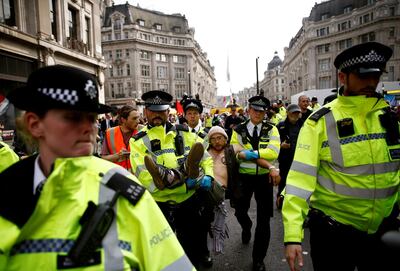"We're asking people to stop spoiling the planet for what is essentially an indulgence," Diane Wiles told The National during a small protest in west London against plans to expand the city's Heathrow Airport.
The retired 57-year-old is part of environmental protest group Extinction Rebellion, which was launched in 2018 and has inspired similar movements internationally.
Waving a flag with the group’s signature hourglass logo on it, Ms Wiles handed leaflets out to those entering a Heathrow consultation meeting, warning that expansion will result in increased noise and air pollution across London.
The protest of two outside a hotel in Brentford is a small one by Extinction Rebellion standards but is part of a sustained period of activism which has attracted thousands of people to the cause.
British police are gearing up for a second period of major disruption this year by the climate activists who officially announced plans on Wednesday to target London Fashion Week in the autumn with civil disobedience protests.
The movement is a non-violent one but more than 1,000 activists were arrested in April after the group staged demonstrations in cities across the UK, bringing parts of central London to a standstill.
Some of those arrested are facing court cases this week accused of public order offences committed during demonstrations across the capital, which saw a camp set up on Waterloo Bridge and Oxford Circus blockaded with a pink boat.

University lecturer Dr Steven Melia, 57, was one of 1,401 Extinction Rebellion activists who have been arrested so far, according to the group’s own figures.
Dr Melia, who had previously advised the British government on eco-towns, was found guilty this week at Westminster Magistrates Court of two charges of failing to comply with a condition to disperse protesters.
He was arrested at Waterloo Bridge after failing to comply with an order to move protesters to a permitted demonstration in nearby Marble Arch and then, once released from custody, arrested a second time after attending another protest in Oxford Circus the following day.
Dr Melia became emotional during the trial while telling the court his actions were justified because they were in response to a “catastrophic” climate emergency.
Leaving the court with a £500 fine, he said after the trial he would continue to campaign for Extinction Rebellion but would “try not to get arrested any time soon”.
The environmental protest group has three key demands; for the British government to declare a “climate and ecological emergency”, for the UK to reduce carbon emissions to net zero by 2025 and for a Citizen’s Assembly to be formed to “oversee the changes”.
Coming into contact with the police during protests which shut down or blockade public parts of the capital is something that Extinction Rebellion protesters are prepared for by taking part in non-violent direct-action training.
Sara Arnold, from Extinction Rebellion's Boycott Fashion team, explained to The National that during large protests some activists are trained to be "arrestables", people who are prepared to be arrested to "protect everyone else".
“It’s a vital part of our tactics,” Ms Arnold, who is not an “arrestable”, said.
“When we blocked Waterloo Bridge, the truck we placed across the bridge blocking it had people chained to the bottom of the truck to keep it in place. They knew they were in a place where they would be arrested and they put themselves in that position knowingly,” she said.
“We had a frontline of arrestables on one side of the bridge and the police were lined up on that side.”

Ms Arnold is calling for London Fashion Week to be cancelled and is involved in Extinction Rebellion’s plans to disrupt the five-day biannual trade show, which begins on September 13.
London’s Metropolitan Police has confirmed it “will have an appropriate policing plan in place” during the city’s Fashion week.
Extinction Rebellion is planning widespread shutdowns in October. The group believe that if 3.5 per cent of the population take part, then this will force the government to act on their demands.
“That’s really the time when we need be asking the government for the systemic change that we need, which will fix the fashion industry and everything else. So it’s really about saying come on the streets then,” Ms Arnold explained.
Deputy commissioner Laurence Taylor of London’s Metropolitan Police has said officers will “not tolerate” the same level of disruption seen in the April protests again.
Extinction Rebellion are believed to have cost police more than £16 million.
There have been calls for more resources to be dedicated to ensure lawbreakers associated with the movement are punished.
A report published by centre-right think tank Policy Exchange, titled “Extremism Rebellion”, recommended the police be more proactive in enforcing laws and legislation be strengthened to deal more effectively with mass lawbreaking tactics.
"You have to uphold the law for everybody regardless of whether you think their cause is legitimate or not otherwise the democratic process becomes irrelevant," one of the report's authors Tom Wilson told The National.

